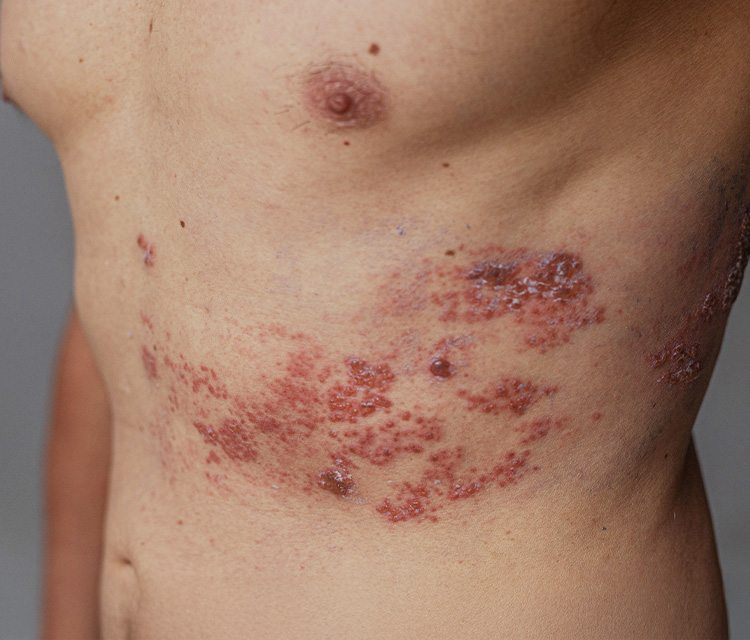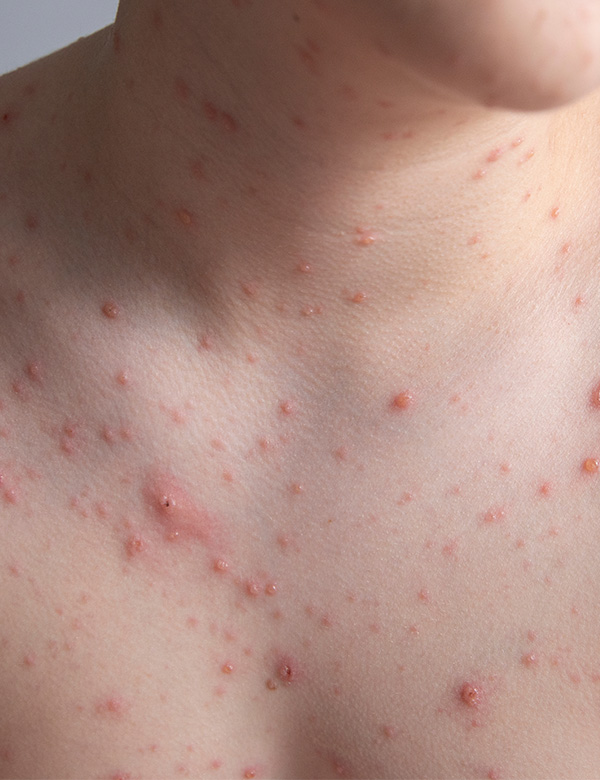Cold sores and blisters in the genital area
Diagnose and treatment of herpes on the lips and in the genital area – by experienced dermatologists at Derma Medical Clinic in Zurich – Sihlcity
Cold sores and blisters in the genital area
Chronische Abszesse und schmerzhafte Knoten durch erfahrenen Hautarzt abklären und behandeln in der Derma Medical Clinic in Zürich - Sihlcity
Painful cold sores or blisters in the genital area – medical treatment for acute herpes outbreaks and preventive advice for future episodes
Examinations
Dermatological examination
Test swab if needed
Treatment options
Antiviral medications
Soothing skin care
Duration
20 minutes
What is herpes?
Herpes is caused by the herpes simplex virus (HSV), which remains in the body after the first infection and can become active again due to triggers like stress, illness or sun exposure.
Cold sores, also called oral herpes (herpes labialis), usually begin with a feeling of tightness, burning and small blisters on the lips.
Genital herpes (herpes genitalis) affects the genital area and can also cause painful blisters, often with redness, itching or a feeling of pressure.
A check-up and treatment make sense if…
- You suffer regularly from cold sores or blisters on the lips
- You get repeated painful blisters in the genital area
- This is your first herpes outbreak and you are unsure what to do
- Your outbreaks are especially painful, last long or cause major discomfort

What is herpes?
Herpes is caused by the herpes simplex virus (HSV), which remains in the body after the first infection and can become active again due to triggers like stress, illness or sun exposure.
Cold sores, also called oral herpes (herpes labialis), usually begin with a feeling of tightness, burning and small blisters on the lips.
Genital herpes (herpes genitalis) affects the genital area and can also cause painful blisters, often with redness, itching or a feeling of pressure.
Who should get herpes checked and treated?
A check-up and treatment make sense if…
- You suffer regularly from cold sores or blisters on the lips
- You get repeated painful blisters in the genital area
- This is your first herpes outbreak and you are unsure what to do
- Your outbreaks are especially painful, last long or cause major discomfort
Treatment
If your symptoms are typical, the dermatologist can usually identify herpes at first glance. For a first outbreak or unclear signs, a swab can confirm the diagnosis.
The examination of the genital area is external and only takes a few moments. Nothing is inserted and there is no gynecological or urological exam.
Your privacy is respected – we proceed gently and explain each step.
What happens during herpes treatment?
The goal is to suppress viral activity and quickly relieve symptoms. We use antiviral medications as cream or in tablet form.
If you have frequent outbreaks, we discuss prevention strategies and help identify triggers. If you wish, we also offer advice on sexuality, fertility or partner transmission.
What does herpes treatment involve?
Initial consultation & examination
At the first appointment, we talk with you about your symptoms, past episodes and possible triggers. Then the dermatologist examines the affected areas.
Diagnosis and therapy
If findings are typical, diagnosis is usually made on the spot. In unclear situations, we take a swab to confirm. We then discuss your treatment options with you.
Start of treatment
Treatment usually begins right away—with tablets or topical creams. We also give you tips on skin care, managing acute symptoms and preventing future outbreaks.
Follow-up care
If you have frequent flare-ups or still feel unsure, we support you beyond the acute phase. If needed, we adjust your treatment or explore long-term care options.

At Derma Medical Clinic, shingles treatment is performed exclusively by experienced specialist dermatologists:
- Benjamin Miller, dermatologist and phlebologist
- Markus Dendorfer, dermatologist with a focus on pediatric dermatology
Both have many years of experience diagnosing and treating acute viral infections.

Dr. med. Benjamin Miller
Board-certified Specialist in Dermatology & Venereology FMH

Dr. med. Markus Dendorfer
Board-certified Specialist in Dermatology & Venereology FMH
What to expect from us
Discreet check-up – respectful care
Especially in intimate areas, trust matters. We examine you discreetly, without contact, and with the utmost respect for your privacy.
Advice beyond the acute phase
We help not only during an outbreak, but also to prevent future ones – for example, by identifying triggers, recommending vaccines or running additional tests.
Quick help for sudden symptoms
Herpes often appears suddenly. We offer short-notice appointments and can start the treatment right at your first visit, if you wish.
Everything in one place
You’ll receive diagnosis, treatment and skincare all in one place. This means fewer appointments, shorter paths and coordinated care—from first consult to follow-up.
Do you have tightness, itching or painful blisters on your lips or in your intimate area?
Book an appointment now for diagnosis and treatment at Derma Medical Clinic in Zurich – Sihlcity.
FAQ – Common questions about cold sores and genital blisters (herpes)
What is herpes?
Herpes is a viral infection caused by herpes simplex viruses (HSV-1 or HSV-2). The most common types are cold sores, also called oral herpes (herpes labialis), and genital herpes (herpes genitalis).
How can I recognize a herpes outbreak?
Typical signs include tightness, itching or tingling, followed by small blisters on red skin. These dry up and scab over, usually healing within 1–2 weeks.
What triggers herpes outbreaks?
The virus “sleeps” in nerve cells and can reactivate due to stress, infections, sun exposure or hormone changes. Physical exhaustion is also a common trigger.
Is herpes contagious?
Yes. Herpes is highly contagious during active outbreaks – through skin contact or shared items (e.g. glasses, lip balm).
How is herpes treated?
Antiviral creams or tablets (like acyclovir) can shorten the outbreak. For frequent outbreaks, a preventive long-term treatment may help. Cooling the area also eases discomfort.
What provides quick relief for lip herpes?
Start using an antiviral cream at the very first sign (tingling, tight feeling). The earlier you treat it, the milder the outbreak tends to be.
How dangerous is genital herpes?
Genital herpes is unpleasant but usually not dangerous. The first outbreak can be very painful. A medical check-up is important—for you and your sexual partners.
Can I have sex if I have herpes?
During an outbreak—especially in the genital area—you should avoid sex, as herpes is highly contagious. Oral sex during lip outbreaks also poses a risk. Condoms reduce the chance of transmission but don’t offer full protection. Once blisters have fully healed, the risk is much lower—but a doctor’s advice is still helpful.
How long is herpes contagious?
You remain contagious as long as blisters or open sores are visible. After the scabs heal, the risk is much lower—but not zero.
How can I prevent herpes?
Strengthening your immune system, sun protection (e.g. lip balm with UV filter), avoiding stress and getting enough sleep can help prevent outbreaks. In some cases, vaccination or long-term treatment is possible.
When should I see a doctor for herpes?
If you get herpes frequently, it doesn’t heal, spreads widely or affects the genitals, eyes or you have a weakened immune system, you should see a doctor.



